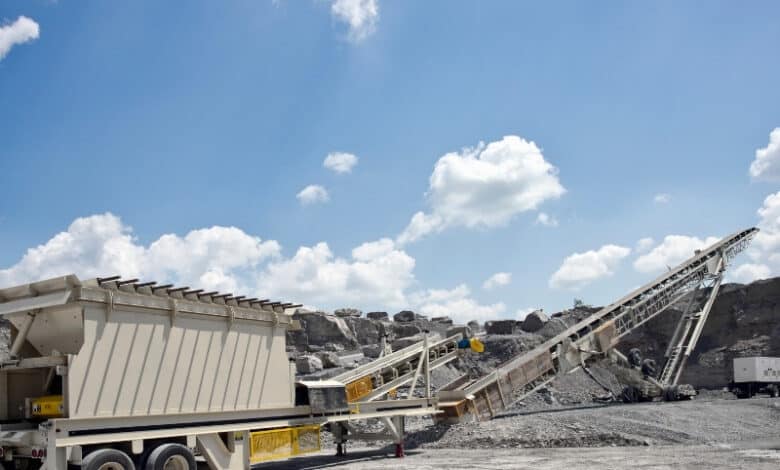
In the construction and mining industries, efficient material processing is essential. Equipment like the crushing plant, jaw crusher, and crushing screening plant play a pivotal role in converting large rocks into smaller, usable materials.
Crushing Plant: Enhancing Aggregate Production
A crushing plant is a comprehensive system designed to break down large rocks and stones into smaller aggregate pieces, essential for construction and various industrial applications. As the first stage in the mineral processing line, it significantly reduces raw material size and prepares it for further processing or direct use. These plants are built to handle heavy-duty operations and come in various configurations, such as stationary and mobile plants.
The configuration of a crushing plant varies based on the specific project and material type. Some setups incorporate several stages, with primary, secondary, and tertiary crushers, while others use single-stage crushers for smaller production needs. The plant’s layout often includes conveyors, screens, and storage units, allowing for a well-organized process flow and efficient handling of materials.
An essential benefit of using a crushing plant is the ability to customize the output size, shape, and consistency according to project needs. With adjustable crushers, companies can control the grain size, ensuring the aggregate meets specifications for different applications, from road base to concrete production. Moreover, modern crushing plants incorporate advanced technology that enhances their safety and energy efficiency, reducing operational costs.
In addition, some models are designed with dust suppression systems and noise reduction features, which are especially useful in urban settings where environmental regulations are stringent. These environmental controls not only make operations compliant but also improve working conditions for site personnel.
In summary, crushing plants are integral in material processing, converting large rocks into a reliable aggregate form that serves as a base for construction projects. With the ability to customize production specifications and the use of advanced technology, these plants streamline operations and make construction materials more accessible and affordable.
Jaw Crusher: Powerhouse of Primary Crushing
The jaw crusher is a primary crusher that uses compressive force to break down large materials into smaller sizes, making it ideal for processing various types of rock, ores, and minerals. This type of crusher consists of two plates, or jaws, one fixed and the other moving, which work together to crush materials with high efficiency. Due to its robust design and reliable operation, the jaw crusher is widely used in mining, construction, and recycling industries.
As part of the primary crushing stage, the jaw crusher has a significant impact on the overall efficiency of the production process. By reducing the size of large rocks early on, it simplifies the material handling in subsequent crushing stages. This crusher is built to handle large input sizes and hard materials, making it suitable for operations where high volumes of material are processed. Additionally, jaw crushers are known for their ability to produce a consistent particle size, essential for downstream processes.
One of the major advantages of a jaw crusher is its simple structure, which allows for easy maintenance and operational flexibility. This crusher’s high-performance design contributes to reduced downtime, as most maintenance tasks can be carried out with minimal disassembly. Furthermore, some models are equipped with hydraulic settings that enable precise control of output size and quick adjustments to match specific application requirements.
Jaw crushers also have applications beyond mining and construction. In recycling, for instance, they are used to break down concrete, asphalt, and other demolition waste, facilitating the reuse of these materials. This contributes to more sustainable construction practices by minimizing the need for raw material extraction.
Overall, the jaw crusher is indispensable in various industries due to its ability to efficiently crush hard materials and produce uniform output sizes. Its reliable operation and ease of maintenance make it an excellent investment for companies looking to enhance their production capabilities.
Crushing Screening Plant: Combining Versatility and Efficiency
A crushing screening plant combines two essential functions in the aggregate processing industry: crushing and screening. This setup not only breaks down large rocks into smaller pieces but also sorts them into different sizes for diverse applications. It offers a versatile solution for companies that require on-site material processing, making it suitable for both stationary and mobile operations.
One of the main advantages of a crushing screening plant is its flexibility. These plants come in various configurations, allowing operators to adjust the setup based on the specific needs of each project. Mobile crushing screening plants are particularly useful in mining and construction sites where the terrain and location change frequently. They offer the convenience of being moved to new sites without requiring extensive disassembly or setup time.
